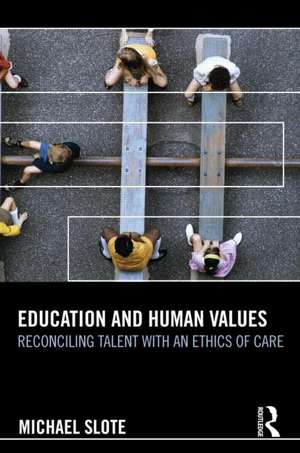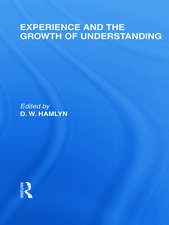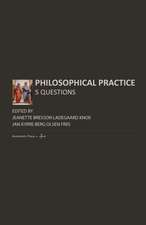Education and Human Values: Reconciling Talent with an Ethics of Care
Autor Michael Sloteen Limba Engleză Hardback – 25 iun 2012
So the present book offers a middle way between the denial of the reality of superior talents and an insensitive insistence on that reality. It argues that care ethics gives us a way to do this, and it bases that claim largely on the promise of such an ethics for moral education in schools and in homes. It is argued on psychological grounds that caring can only take place on the basis of empathy for others, and the book shows in great detail how empathy can be encouraged or develop in school and home contexts. Other approaches to moral education—like Kantian cognitive-developmentalism and Aristotelian character education—can’t account for (increasing) moral motivation in the way that an emphasis on the development of empathy allows. And in the end, it is only students educated via care ethics who will be sensitive to one another in a way that largely undercuts the negative psychological impact of educational institutions and practices that acknowledge the greater talents or creativity that some students have.
| Toate formatele și edițiile | Preț | Express |
|---|---|---|
| Paperback (1) | 376.88 lei 6-8 săpt. | |
| Taylor & Francis – 16 iul 2015 | 376.88 lei 6-8 săpt. | |
| Hardback (1) | 1051.48 lei 6-8 săpt. | |
| Taylor & Francis – 25 iun 2012 | 1051.48 lei 6-8 săpt. |
Preț: 1051.48 lei
Preț vechi: 1282.29 lei
-18% Nou
Puncte Express: 1577
Preț estimativ în valută:
201.23€ • 207.88$ • 167.47£
201.23€ • 207.88$ • 167.47£
Carte tipărită la comandă
Livrare economică 26 martie-09 aprilie
Preluare comenzi: 021 569.72.76
Specificații
ISBN-13: 9780415530958
ISBN-10: 0415530954
Pagini: 106
Dimensiuni: 152 x 229 x 8 mm
Greutate: 0.32 kg
Ediția:1
Editura: Taylor & Francis
Colecția Routledge
Locul publicării:Oxford, United Kingdom
ISBN-10: 0415530954
Pagini: 106
Dimensiuni: 152 x 229 x 8 mm
Greutate: 0.32 kg
Ediția:1
Editura: Taylor & Francis
Colecția Routledge
Locul publicării:Oxford, United Kingdom
Notă biografică
Michael Slote is the UST Professor of Ethics at the University of Miami. He is a former Tanner Lecturer and a Member of the Royal Irish Academy. He has written many books and articles on ethics and political philosophy, most recently The Impossibility of Perfection: Aristotle, Feminism, and the Complexities of Ethics (Oxford, 2011).
Recenzii
'Education and Human Values is worth reading by those interested in the ethics of care or the philosophy of education, and might be assigned in classes on those topics. It may also have value to those interested in moral sentimentalism in general. [These groups] should take the time to read it and consider its arguments.' – Alexander Jech, University of North Carolina at Chapel Hill, USA in Notre Dame Philosophical Reviews
Cuprins
Introduction 1. Education and Creativity 2. Care Ethics vs. Other Approaches 3. Sentimentalist Moral Education 4. Sentimentalist Rational Education 5. What Kind of Country? Conclusion
Descriere
In Education and Human Values: Reconciling Talent with an Ethics of Care, Michael Slote looks to care ethics to provide an answer to previously neglected questions, arguing that if we can teach people to be more caring and open-minded, we can take some of the edge off of the disappointment and resentment that occur when people are led to believe they are less talented or less intelligent than others. Through his demonstration of the inadequacies of an educational system devoted to maintaining a classroom atmosphere of blind democracy and absolute equality, Slote's work constitutes an answer to important questions his predecessors were unable to recognize or simply failed to address.

























